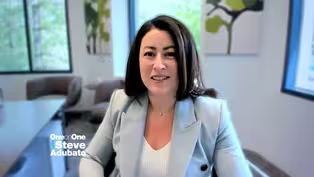One-on-One
Examining tuberculosis and the role of mentorship
Clip: Season 2025 Episode 2837 | 9m 13sVideo has Closed Captions
Examining tuberculosis and the role of mentorship in academic labs
Steve Adubato is joined by David Alland, MD, Director of The Public Health Research Institute and Professor and Chief of Division of Infectious Diseases at Rutgers New Jersey Medical School, to examine his innovative tuberculosis research and the role of mentorship in academic laboratories.
Problems playing video? | Closed Captioning Feedback
Problems playing video? | Closed Captioning Feedback
One-on-One is a local public television program presented by NJ PBS
One-on-One
Examining tuberculosis and the role of mentorship
Clip: Season 2025 Episode 2837 | 9m 13sVideo has Closed Captions
Steve Adubato is joined by David Alland, MD, Director of The Public Health Research Institute and Professor and Chief of Division of Infectious Diseases at Rutgers New Jersey Medical School, to examine his innovative tuberculosis research and the role of mentorship in academic laboratories.
Problems playing video? | Closed Captioning Feedback
How to Watch One-on-One
One-on-One is available to stream on pbs.org and the free PBS App, available on iPhone, Apple TV, Android TV, Android smartphones, Amazon Fire TV, Amazon Fire Tablet, Roku, Samsung Smart TV, and Vizio.
Providing Support for PBS.org
Learn Moreabout PBS online sponsorship(upbeat music) - We're now joined by Dr. David Alland, who is Director of the Public Health Research Institute at Rutgers New Jersey Medical School.
Doctor, good to see you.
- Good to see you too.
- You got it, we met each other at the EJI Excellence in Medicine Awards.
You were in fact awarded the Outstanding Scientist Award for your research and your work in the area of tuberculosis research.
First of all, congratulations.
- Thank you.
- Second of all, tell us about the research and why it's so significant.
- So we've done research in several important areas.
We're perhaps best known in tuberculosis diagnostics.
TB is a pretty terrible disease that will ultimately kill half the people infected And up until we developed this new rapid test for tuberculosis, it could take months to make a diagnosis, and just as long, even longer, to find out if the TB was drug resistant.
And so we developed a test that happened in a little cartridge that could be done pretty much anywhere in the world where there's electricity.
It could give you a diagnosis in under an hour.
- How did you become and why did you become so interested in research around tuberculosis?
- Well, tuberculosis is a disease that we don't see a lot in the United States.
But back in the 1980s when I did my training, we had an outbreak in New York City, there were about 700.
- I'm sorry I for interrupting, doctor, your training in infectious disease.
- Infectious disease, yeah.
- I apologize, go ahead.
- No, of course.
And there were about 750 cases of multi-drug resistant tuberculosis during that time.
It cost about $3 billion in 1980s dollars to stop that outbreak.
And a lot of people suffered, a lot of people died from that.
And the cost to the healthcare system were immense.
And that brought home very much the threat that we have in the United States from tuberculosis if we don't find faster ways to diagnose it and to treat it.
But the other problem is that TB is still the biggest single killer from a single infectious disease in the world.
There is about 10 million cases a year and about 1.4 million deaths.
And the worst part about TB is that it kills people in their prime working years where they leave children and orphans.
And it also interacts with HIV so that people who are HIV infected who living or who are living with AIDS, are at much higher risk.
So it's really a global problem and we thought it was something that would be really exciting to address.
- Switch gears for a second, I'm curious about this.
To what degree do you believe, lemme try it this way, funding for research, government funding of the kind of research you just described, doctor, A, why is it so significant, B, what do you say to those who say, "I'm just cutting waste, fraud, and abuse at NIH, the National Institutes of Health?"
- Well, I think I'll speak to the first question about why it's worth funding tuberculosis.
And we can talk about waste, fraud and abuse afterwards, because they're not completely related.
But there are a lot of diseases in the world of poverty where people don't have 80 or $100,000 a year to pay for advanced cancer therapies, for example, where simple drugs can save their lives.
And there's not a lot of money to be made.
And so tuberculosis is not a high priority.
And for most companies, it is not a priority at all, for developing drugs and diagnostics.
And so the government really has to step in at that point.
Otherwise, these therapies and these diagnostics won't be made, but it can still come around and bite us.
Just because a disease can't make money for a drug company doesn't mean it isn't very severe.
I should point out that this problem is not just in tuberculosis, but really the entire field of infectious diseases.
People are talking about the post antibiotic era for infectious diseases.
You know, just a hundred years ago, people lost significant number of their children to infectious diseases.
People died in their 40s, 50s to 60s of pneumonia.
And then with the advent of penicillin around the 1940s and then new antibiotics after that, we've been able to save millions and millions of lives, including the United States.
We've been able to do things like transplants where people are immunocompromised and can't survive without getting lots of infections and treated with the drugs, and there's very little investment in that type of thing in the United States now because people take antibiotics for two weeks and they get better.
People take Lipitor, for example, for the rest of their life.
So there's so much more money to be made, and you really need the government to support that.
- I wanna ask you about something else.
We're doing a series and the graphic will come up right now.
Tomorrow's Physicians, what role have you played?
'Cause I know from the folks we're working with at EJI, your role, tell the folks watching right now your role in working with mentoring students in medical school right now.
Talk about that please, doctor.
- So I've had two roles.
One is to walk around with them on rounds and seeing patients with an infectious disease.
My role there is both to teach about infectious disease, to teach about why it's such a wonderful field to get into, because to be a good infectious disease doctor, you have to know all the medicine.
The other role is to teach compassion, to teach communication, very important aspects that young doctors don't always learn.
So that's in the clinical side.
In the research side, my role really is just to share my passion for research, to share my excitement for discovering something new, to stop people and say, "Listen, you actually have something today that only you and I know of in the world.
Think about how exciting that is," and to share that excitement.
- I'm gonna follow up on this.
In the post-COVID world that we're living in, you understand this in a way that most of us cannot, the question of preparedness.
To what degree, Dr. Alland, do you believe that we as a country with our public health infrastructure, what it is, to what degree do you believe we are prepared if and when we face another pandemic?
- I think we're probably worse prepared now than we were even before the COVID pandemic.
- How could that possibly be true?
- I think that there have been a lot of myths about this, how will vaccines work, especially RNA vaccines.
I think there's been a lot of pushback, and perhaps somewhat very rightly, for the degree of lockdowns and the amount of people, children, they were excluded from school.
And I think there are a lot of misunderstandings really, of scientists.
When we were asked questions about the pandemic at first, we got a lot of things wrong, as you might expect to happen with an entirely new disease.
And we were self-correcting, we were coming out with new recommendations as we learned more.
But I think that we didn't message well enough to show that that's how science works, and that's not the failure of the system, but it's actually how the system works best is to be self-correcting.
So a lot of confidence was lost, a lot of support was lost.
So we have less funding for public health, the CDC has been decimated by recent firings.
Entire laboratories that monitor disease have been closed, websites have gone blank that let us know what's going on.
- That's Dr. David Alland, Director of the Public Health Research Institute at Rutgers New Jersey Medical School.
Check out the follow-up interview we do with him.
Doctor, thank you so much for watching.
I'm Steve Adubato.
Trust me, the doctor will be in the house in another program.
See you next time.
- [Narrator] One-On-One with Steve Adubato is a production of the Caucus Educational Corporation.
Funding has been provided by EJI, Excellence in Medicine Awards.
A New Jersey health foundation program.
Horizon Blue Cross Blue Shield of New Jersey.
New Jersey’s Clean Energy program.
PSE&G.
Newark Board of Education.
The Port Authority of New York and New Jersey.
PSEG Foundation.
The Fidelco Group.
And by Community FoodBank of New Jersey.
Promotional support provided by The New Jersey Business & Industry Association.
And by Insider NJ.
Highlighting Beyond the Gates, a groundbreaking soap opera
Video has Closed Captions
Clip: S2025 Ep2837 | 9m 56s | Executive Producer of Beyond the Gates highlights their new soap opera (9m 56s)
The importance of female representation in the legal field
Video has Closed Captions
Clip: S2025 Ep2837 | 8m 28s | The importance of female representation in the legal field (8m 28s)
Providing Support for PBS.org
Learn Moreabout PBS online sponsorship
- News and Public Affairs

Top journalists deliver compelling original analysis of the hour's headlines.

- News and Public Affairs

FRONTLINE is investigative journalism that questions, explains and changes our world.












Support for PBS provided by:
One-on-One is a local public television program presented by NJ PBS

